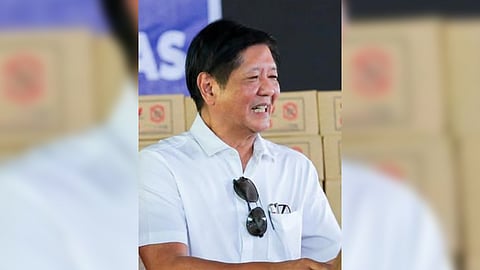
- NEWS
- the EDIT
- COMMENTARY
- BUSINESS
- LIFE
- SHOW
- ACTION
- GLOBAL GOALS
- SNAPS
- DYARYO TIRADA
- MORE

President Ferdinand Marcos Jr. marked Easter Sunday with a call for Filipinos to let their faith guide them in helping address the nation’s present challenges.
“To be true pilgrims of hope, it is not enough to say He is risen while leaving others buried — in debt, in hunger, and in silence. If Christ walked out of the tomb, then no one should remain sealed inside theirs,” Marcos said in his Easter Sunday message.
“The Resurrection is not just a moment to celebrate, it is a call to action. The risen Christ does not rise alone, He invites us to rise with Him — through policies that heal, through laws that protect, and through governance that leaves no one behind,” the President added.
Marcos also highlighted the enduring importance of forgiveness and solidarity as Lent — one of the most solemn religious observances in the predominantly Catholic Philippines — ended.
“As wounded as He rises from the tomb, Jesus showed the world the power of His love that resonated through the ages and consistently invites us to bear compassion, forgiveness, and solidarity for our brethren,” Marcos said.
“The triumph of Easter Sunday is not just a celebration filled with hope and aspiration for a better tomorrow, but also a testament to the victory of life over death, hope over despair, and light over darkness. It is a clear and solemn affirmation that challenges are not the end, but the means for the reward that we, too, shall receive through our faithfulness in doing the will of the Almighty,” he added.
Marcos said that as the “stone has been rolled away,” the nation is now exposed not just to “boundless possibilities,” but also to the knowledge that everyone can “make a difference.”
“Let us manifest the strength of our faith with the work of our hands and, together, build the Bagong Pilipinas we aspire for our people. Together with the faithful, I greet everyone with the fierce, uncontainable joy of the Resurrection,” he said.
Meanwhile, Cardinal Jose Advincula urged Filipino Catholics not to be afraid of being shaken — especially in an age when truth has become increasingly hard to discern due to fake news and artificial intelligence.
“Being shaken should not terrify us,” he said in his Easter message. He reminded the faithful that key moments in Christ’s story were marked by upheaval.
“When Christ died on the cross, the earth shook and the rocks were split,” Advincula said. “When He rose from the dead, there was a great earthquake and an angel descended from heaven to roll back the stone.”
The cardinal said this symbolic ‘shaking’ can be transformative for the Church and the faithful.
“Being a ‘community of the shaken’ can lead us to become a ‘community of synodality and solidarity,’” he said. “We do not give in to panic or rage. We journey together with courage and patience. We stand firmly on our anchor and strong foundation.”
He assured believers that, through Christ, no hardship is insurmountable.
“The Risen Lord has conquered all. No trouble will overwhelm us. No trial will break us,” he declared. “We will never grow tired of proclaiming this most important message of our Christian faith: Christ is alive. He has overcome death. He walks with us today. He brings light to our troubled lives. He takes away our fears of an unpredictable future. He guides us in our perilous journey in a volatile, uncertain, complex and ambiguous world.”
Advincula also encouraged Catholics to become beacons of hope.
“We are witnesses to the flame of hope that the resurrection has sparked in us,” he said. “Let us continue to be pilgrims of hope in a mission of mercy and love.”
The Filipino celebration of Easter begins at dawn with a procession called Salubong, which reenacts the meeting of two images — the Risen Christ and a mourning Mary. This typically begins around four in the morning and is followed by Easter Masses throughout the day.
Roughly 80 percent of the Philippines’ 110 million population identify as Roman Catholic.
